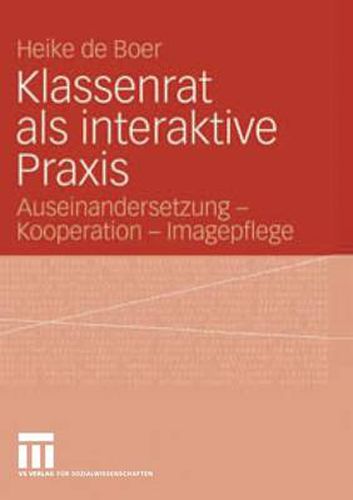Readings Newsletter
Become a Readings Member to make your shopping experience even easier.
Sign in or sign up for free!
You’re not far away from qualifying for FREE standard shipping within Australia
You’ve qualified for FREE standard shipping within Australia
The cart is loading…






This title is printed to order. This book may have been self-published. If so, we cannot guarantee the quality of the content. In the main most books will have gone through the editing process however some may not. We therefore suggest that you be aware of this before ordering this book. If in doubt check either the author or publisher’s details as we are unable to accept any returns unless they are faulty. Please contact us if you have any questions.
Heike de Boer setzt sich mit der Frage auseinander, was der Klassenrat fur die Akteure bedeutet. Die interaktive Praxis des Klassenrates steht im Mittelpunkt der qualitativ-empirischen Untersuchung und fuhrt zur Rekonstruktion der kindlichen Perspektive als Akteursperspektive. Peer-Interaktionen werden fokussiert, ohne die schulpadagogische Frage nach interaktivem Lernen auszublenden. Die konsequent ethnografische Sicht ermoeglicht Irritationen der normativen Erwartungen an den Klassenrat und zieht eine Neubestimmung der Grenzen und Chancen nach sich.
$9.00 standard shipping within Australia
FREE standard shipping within Australia for orders over $100.00
Express & International shipping calculated at checkout
This title is printed to order. This book may have been self-published. If so, we cannot guarantee the quality of the content. In the main most books will have gone through the editing process however some may not. We therefore suggest that you be aware of this before ordering this book. If in doubt check either the author or publisher’s details as we are unable to accept any returns unless they are faulty. Please contact us if you have any questions.
Heike de Boer setzt sich mit der Frage auseinander, was der Klassenrat fur die Akteure bedeutet. Die interaktive Praxis des Klassenrates steht im Mittelpunkt der qualitativ-empirischen Untersuchung und fuhrt zur Rekonstruktion der kindlichen Perspektive als Akteursperspektive. Peer-Interaktionen werden fokussiert, ohne die schulpadagogische Frage nach interaktivem Lernen auszublenden. Die konsequent ethnografische Sicht ermoeglicht Irritationen der normativen Erwartungen an den Klassenrat und zieht eine Neubestimmung der Grenzen und Chancen nach sich.